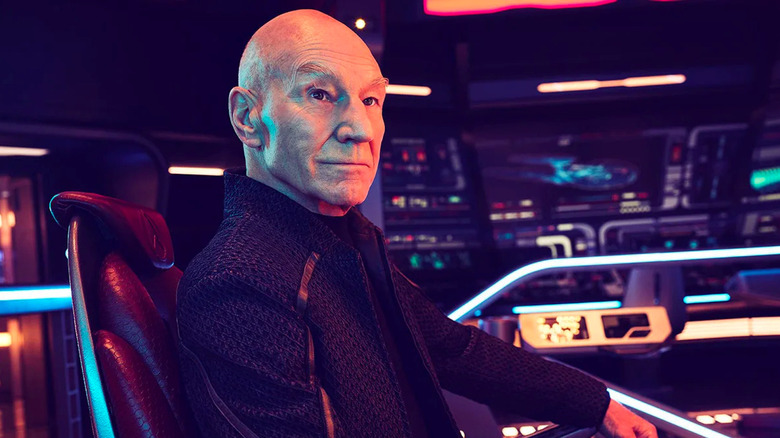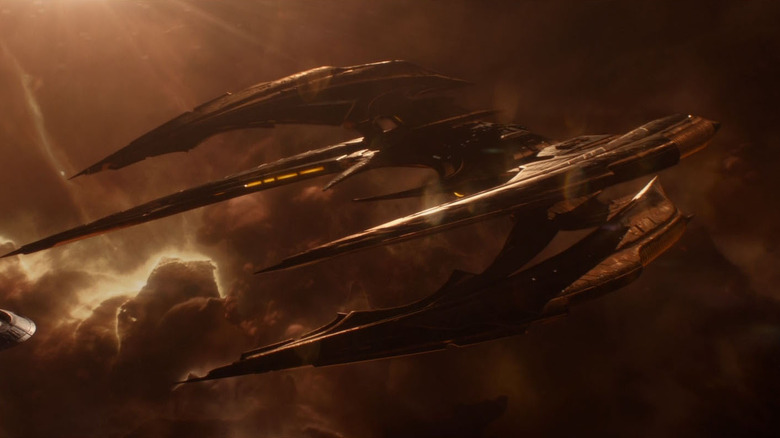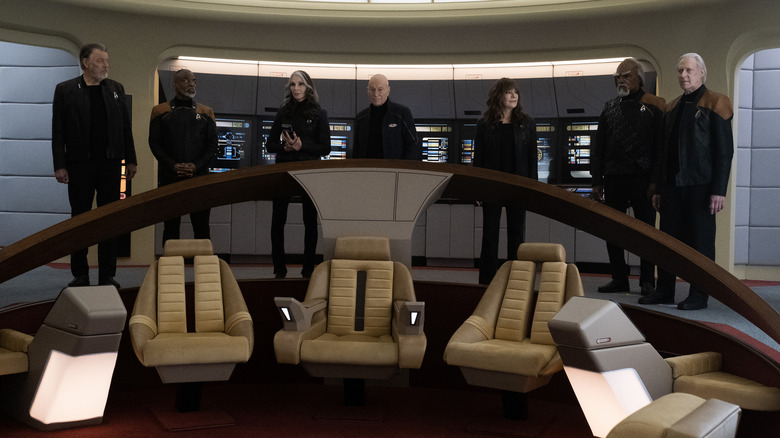Scoring Star Trek: Picard Season 3 Took A 'Brutal' Toll On The Series' Composer
The third season of "Star Trek: Picard" was largely constructed of nostalgic material. While it did tell an exciting action movie story, the season's raison d'être was merely to reunite the cast of "Star Trek: The Next Generation" after 21 years and put them on the bridge of the Enterprise-D for One Last Ride. Showrunner Terry Matalas, for the bulk of the season, found a good balance between exciting new "Star Trek" developments and recognizable "Star Trek" throwbacks. It was a pretty good blend of the new and the old.
One of the more recognizable elements of the season was likely the score, composed by Stephen Barton. Like the rest of the season, Barton mixed original Trek music with a lot of older, more recognizable themes. When a villain's starship appeared on screen, Barton employed the "bwaaah" musical sting created by Jerry Goldsmith for "Star Trek: The Motion Picture." Additionally, the season's closing credits were taken from the credits of "Star Trek: First Contact," which was also scored by Goldsmith. And, of course, one might hear some of the classical "Star Trek" TV themes hiding throughout, including the famous original theme by Alexander Courage, as well as those for "Deep Space Nine" (by Dennis McCarthy) and "Voyager" (Goldsmith again).
The approach to "Picard" was to make it look and feel like a movie, and Barton was prepared to score the season like he might a feature film. The problem was, with 10 full episodes, that would require a huge amount of music. At Deadline's recent Sound & Screen event, Barton admitted that he perhaps bit off more than he could chew. In order to get all the music composed, the poor composer ran himself ragged. Eventually, he had to pass composing duties to Frederik Wiedmann.
Seven hours of music
"Star Trek" is typically more music-forward than a lot of TV shows currently airing, so Barton had his work cut out for him; it was essentially five features worth of sound, all needed on a TV schedule. Barton also wanted to make sure themes weren't reused too much, requiring just that much more composition. He described the project thus:
"We decided we were going to try to score all of it which meant writing seven hours of music. [...] think about four hours in I was literally dead, absolutely. I was doing seven days weeks, 16-hour days, I hadn't seen my family. It was absolutely brutal."
Showrunner Terry Matalas was the one to notice that Barton was burning about a bit. By the time he had completed the first six of the season's episodes, Barton must have looked like death on legs, as Matalas suggested he take a break and allow another composer — one who wasn't about to drop from exhaustion — take his place. It seems that Frederik Wiedmann was game to pick up where Barton needed to leave off, but also that he almost missed the offer because of his e-mail spam filter. Wiedmann, also speaking at the Deadline event, said:
"I almost missed that email that was supposed to reach me because it ended up in my spam folder from my website email contact form. [...] It took me a week to finally see that, which was quite mortifying: Start this day, here's episode seven, and go."
And go they did.
The pressure of iconic Trek moments
Each composer, it seems, had to shoulder one notably iconic moment in the series, and those moments, they both said, were the hardest to nail. Barton was tasked with writing the theme for the U.S.S. Titan-A, the central ship of the series, helmed by Captain Liam Shaw (Todd Stashwick). As the Titan-A — a ship that had been recently overhauled and rebuilt — left spacedock, it needed an appropriately grand theme to stress Trek's usual glories of space travel. Wiedmann, meanwhile, had to write the music for a notable moment later in the series when Patrick Stewart and his "Next Generation" co-stars all walked onto the bridge of the Enterprise-D — a ship previously thought destroyed — for the first time in decades. The former was a classic Trek moment. The latter was a nostalgia shot. Both needed to be done just right.
Barton in particular knew his musical influences. "We're talking Dennis McCarthy," he said. "We're talking Leonard Rosenman, Cliff Eidelman, Alexander Courage."
Rosenman wrote the score for "Star Trek IV: The Voyage Home," in addition to classics like "East of Eden," "Beneath the Planet of the Apes," and "Barry Lyndon" (for which he won an Academy Award). Eidelman wrote the music for "Star Trek VI: The Undiscovered Country" as well as gentle Hollywood fare like "My Girl 2," "Free Willy 3: The Rescue," and "The Sisterhood of the Traveling Pants." As well as writing the theme for "Deep Space Nine," McCarthy also scored 88 episodes of "Next Generation" and the film "Star Trek: Generations."
Barton and Wiedmann, for doing such incredible work, can now take their rightful place among those venerated names.


